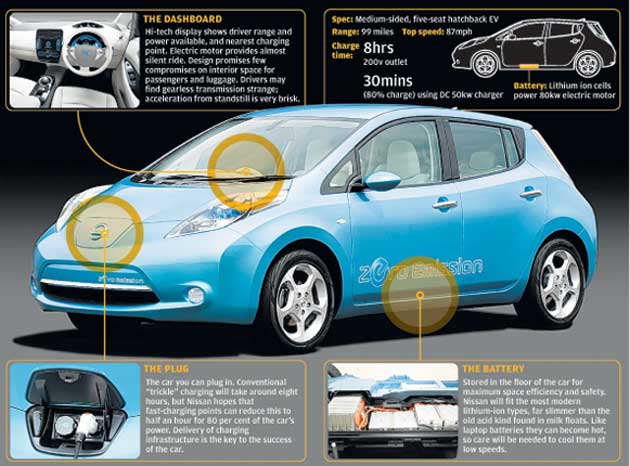Nissan turns over a new Leaf with a zero-emission family hatchback
Company targets Ford Focus market with British-made all-electric car – but where will you be able to charge it?

With their new Leaf, Nissan are offering motorists a potentially revolutionary choice; a useable, practical, conventional-looking electric vehicle that will be in dealer showrooms by this time next year and for the price of an equivalent Ford Focus. It differs from petrol-electric hybrid models on the market now, such as the Toyota Prius and Honda Insight, in that it entirely dispenses with the internal combustion engine. It is truly all-electric, and can be plugged in to the mains like any other appliance. As a zero emissions vehicle (not counting those produced at the power stations that generate its electricity) the Leaf is also far greener than the most fuel-miserly hybrids or small diesel and petrol models. Nissan describe their newest addition as "the world's first affordable, mass produced zero emission car".
Nissan hopes to convince consumers that, in sharp contrast to the existing electric cars on the market, such as the tiny Reva G-Wiz, the Leaf will be free of the limitations and flaws traditionally associated with this type of vehicle. Rather than the 40-mile range common among electric vehicles, and often much lower if the car is driven hard, the Leaf's promises a "real world" range of 100 miles; more than sufficient for most journeys. A top speed of 90mph is also claimed, and it is a full five-seat hatchback of the type familiar to many families.
Crucially, Nissan says it has found a way of shortening the time it takes to recharge the batteries. Although they can be trickle charged for eight hours, a rapid-charging system will deliver 80 per cent of the car's capacity in 30 minutes at special high-current charging stations, though they will be rare.
Andy Palmer, senior vice president at Nissan said: "The world is at the dawn of a new era in automotive transport. Nissan Leaf, which will go on sale later this year, is a five-seater hatchback that offers the same space, practicality and performance of a similar car in its class – minus the tailpipe emissions."
Nissan, which is part owned and controlled by Renault, has developed the Leaf as an all-new platform so it shares few parts with any existing Nissan or Renault models. It uses modern lithium ion batteries, which are more powerful and efficient than the acid battery types found in milk floats. They are housed under the passenger compartment floor to maximise interior space – bulky batteries being another problem that electric car designers have found it difficult to overcome. The Leaf's engineers have also paid attention to its aerodynamics, the teardrop shape and completely flat underbelly yielding exceptionally good wind tunnel performance. A dash display shows the driver how much range and charge is left, and the nearest charging points. The Government's "Plugged-in Places" scheme is designed to boost the number of electric charging points. Nine cities and towns in the UK are to have charging points for electric vehicles under the £11m development plan. Birmingham, Coventry, Glasgow, London, Middlesbrough, Milton Keynes, Oxford, Newcastle and Sunderland will be the first to benefit, while some car parking spaces in London and elsewhere offer free charging for electric car drivers. Boris Johnson, the mayor of London, wants 25,000 charging points in the capital by 2015.
Taking into account a £5,000 Government subsidy and factoring in the savings in running costs, Nissan say that their pricing package for the Leaf will be equivalent to that of a conventional Ford Focus or Volkswagen Golf.
The Leaf is the first of a wave of electric vehicles expected soon. Vauxhall will probably launch its Ampera electric car within two years, and there are high hopes that it too will be made in Britain. Smart make an electric version of their city car, and Mitsubishi will soon launch a four-seat electric city car; Citroen and Peugeot's version will soon follow. A Lotus electric sports car was seen at the Geneva show last month; even Porsche and Ferrari are testing hybrids. The Tesla sports car, costing almost £100,000, proves that electric cars need not be slow. The Transit-sized Modec electric van, built in Coventry, is used by supermarkets to make deliveries in urban areas.
The pace of adoption of electric vehicles will initially be heavily dependent on how rapidly government, local authorities, car parking companies and supermarkets can build the charging infrastructure, especially rapid-charge points. Those without their own drive and flat-dwellers in particular, have always found it difficult to use an electric car because of a need to trail wires across pavements. The price of petrol and diesel, set to rise again to 120p a litre or beyond, will also be a significant factor in driving demand.
Nissan's Sunderland factory is one of three plants that will produce the Leaf, with Oppama, Japan and Smyrna, Tennessee.
Join our commenting forum
Join thought-provoking conversations, follow other Independent readers and see their replies
Comments
Bookmark popover
Removed from bookmarks